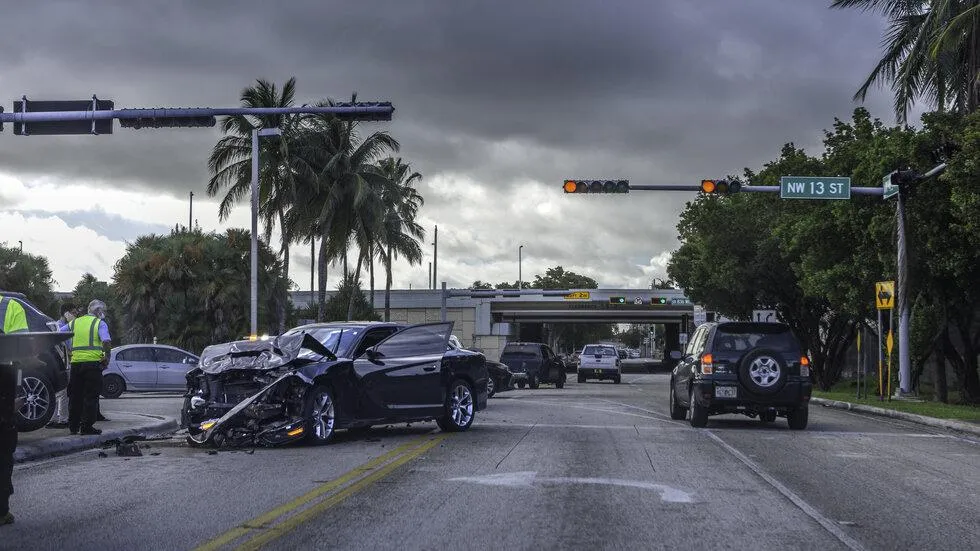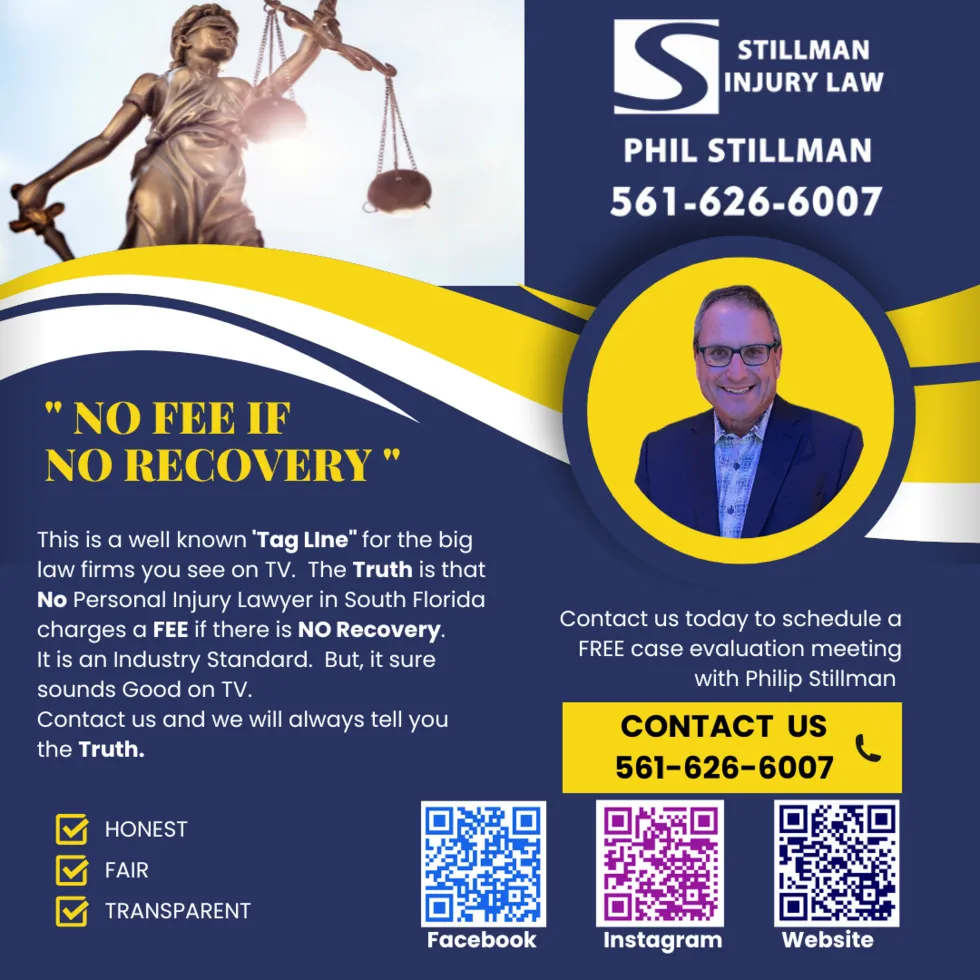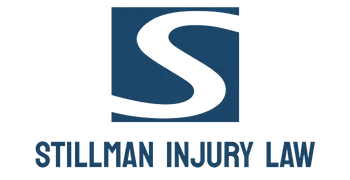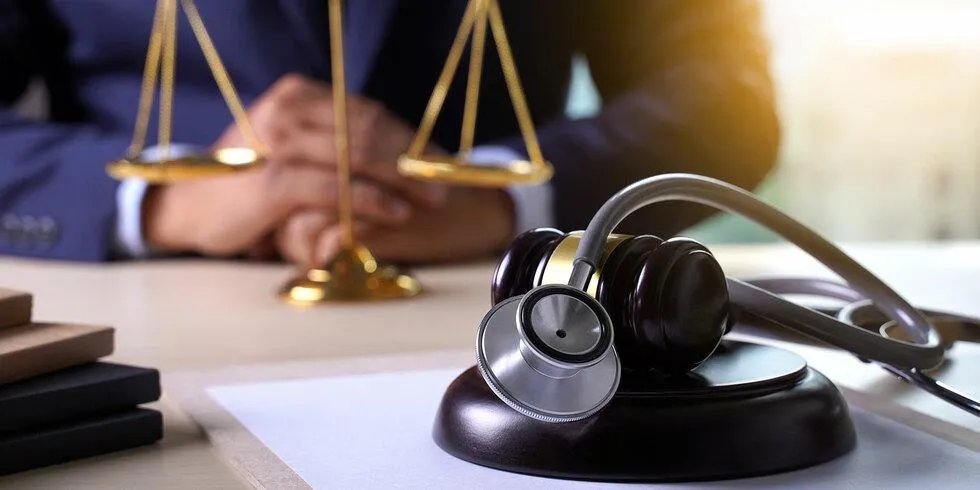Stillman Injury Law - Auto Accident Attorney in Florida
Auto accidents occur every hour of every day. They are one of the most common sources of personal injuries. Drivers responsible for the accident are liable for any damages, whether that's personal bodily injury or property damage. Insurance payouts that are fair and adequate can cover the costs of some damage, but oftentimes, it's not enough. When it's not enough, you may need a personal injury lawyer who has specific experience with auto accidents.
At Stillman Injury Law, our auto accident attorney in Florida can help you file a solid, well-supported personal injury claim to ensure you receive just and fair compensation. Contact us via the chat widget or at 561-626-6007 to schedule a Free Consultation about your case today.
For more information click below!
Common Auto Accident Injuries in the cities of Lake Worth, Greenacres, Lantana, Boynton Beach, Palm Springs, West Palm Beach, Wellington and Boca Raton
Injuries sustained from auto accidents can range anywhere from minor to fatal. The types of immediate bodily injuries often involved in personal injury claims include:
Broken Bones/Fractures
Lacerations and Cuts
Nerve damage
Whiplash
Spinal Injuries
Traumatic Brain Injuries
Chronic Pain
Any and all of the above injuries can be serious and life-threatening. All bodily injuries – regardless of their severity – are compensable if you are the victim of the accident. In many cases, psychological, mental, and emotional injuries are also compensable.

Types of Auto Accidents in Florida
The type of injuries you sustain depends on the type and manner of the car accident. Common types of crashes include:
Head-on collisions - which are among the most devastating types of collisions that result in serious and life-threatening bodily injuries
Rear-end accidents - which are among the most common and frequently result in whiplash
Side-impact collisions - which are common, usually occur at intersections and result in a range of injuries depending on where the vehicle was struck
Roll-over accidents - which are less common but result in head and neck injuries
Sideswipe accidents - which are less common and occur when one of two or more vehicles traveling parallel with each other swipes the side of the other vehicle
Blind spot accidents - which are less common and occur when one vehicle fails to spot another vehicle while changing or merging into another lane
The type of car accident can indicate liability for property and bodily damages. It's important to remember, though, that accidents can be complex events, and so though the type may initially and seemingly indicate fault, a thorough investigation must be conducted for a clear understanding of where liability falls.
Common Causes of Auto Accidents in Florida
Car accidents happen due to many reasons. Typically, causes can be grouped into three categories: drivers, vehicles, and environment.
Drivers
Intoxicated driving (ie, alcohol, marijuana, prescription drugs, illicit drugs)
Distracted driving (ie, eating, texting, disciplining children)
Drowsy driving or falling asleep while driving
Speeding or reckless driving
Decision error (ie, driving too fast for the conditions, misjudging another driver's actions)
Recognition error (ie. Inattention)
Performance error (ie, overcompensation, poor directional control)
Vehicles
Tires/wheels-related
Brakes-related
Steering/suspension/transmission,
Engine-related
Manufacture defects
Environment
Slick roads (e.g., ice, loose debris)
Glare View obstructions
Signs/signals
Most crashes are the direct result of one driver. Aside from crashes caused by drivers, vehicles, or environmental conditions, there are other reasons that don't fall within these categories. For instance, pedestrians can sometimes be the cause of an accident. In other circumstances, the cause cannot be determined. When the cause of an auto accident is easily identified, liability will also tend to be easily identifiable. More complex auto accident cases, however, require the insight of an experienced auto accident attorney and the knowledge and expertise of expert witnesses.
Benefits of Filing a Personal Injury Claim in Florida
After a car accident, insurance companies will investigate the cause of the wreck to see who was at fault. They will then offer to cover the victim's expenses. Insurance companies, however, are for-profit entities. They make money by bringing in premium payments and increase profit margins by minimizing the amount of money they pay out in settlements.
When an insurance company offers a settlement, that offer may not represent the true value of fair compensation a victim deserves. Victims should be compensated for their:
Medical bills, past, and future
Property damage
Lost wages, past, and future
Reduced earnings
Pain and suffering
Emotional distress
And more .....
Frequently, insurance settlement offers only cover property damage and medical bills, and only those expenses incurred to date. Sometimes the settlement will also include lost wages, but again, it may only include the wages lost to date and not future wages or loss of earned income. Much of it depends on the rules of your jurisdiction.
What is Personal Injury Protection (PIP) coverage in Florida, and how much coverage is required for drivers?
Personal Injury Protection (PIP) coverage is a type of auto insurance required for Florida drivers. It ensures that, in the event of a car accident, the policyholder has financial assistance to cover medical expenses and other related losses. Florida law mandates that drivers must carry a minimum of $10,000 in PIP coverage. This helps provide quick payouts for covered injuries without the need to establish fault, facilitating faster medical treatment and recovery.
What are the benefits provided by a personal injury protection policy, including coverage for medical expenses, lost wages, and death benefits?
A personal injury protection policy typically offers comprehensive benefits to support policyholders in the event of an accident. The policy generally covers a significant portion of medical expenses, usually up to 80%, which includes costs incurred from treatments and hospital visits. Additionally, the policy aids with transportation costs associated with medical appointments. For those unable to work due to their injuries, the policy provides compensation for lost income, covering about 60% of the wages lost. In the unfortunate event of a policyholder's death resulting from an accident, the policy also provides a fixed sum, commonly around $5,000, to support related expenses.
What are damage caps in personal injury cases, specifically punitive damages, and what are the legal limits in Florida?
Damage caps in personal injury cases refer to the legal limits imposed on the amount of money that can be awarded to plaintiffs for punitive damages. Punitive damages are intended to punish the defendant for particularly harmful behavior and to deter similar actions in the future. In Florida, the law restricts the award for punitive damages in personal injury lawsuits. The limit is set at either three times the amount of compensatory damages—which include expenses for things like medical bills and repair costs—or $500,000, whichever amount is greater.
Contact an Auto Accident Lawyer in Florida Today
Auto accidents can be straightforward or complex. Regardless of which, it is in your best interests to speak to an auto accident attorney. At Stillman Injury Law , we work hard for our clients to obtain fair and just compensation. Contact us using our online form or by calling us directly at 561-626-6007 to schedule a Free Consultation today.


